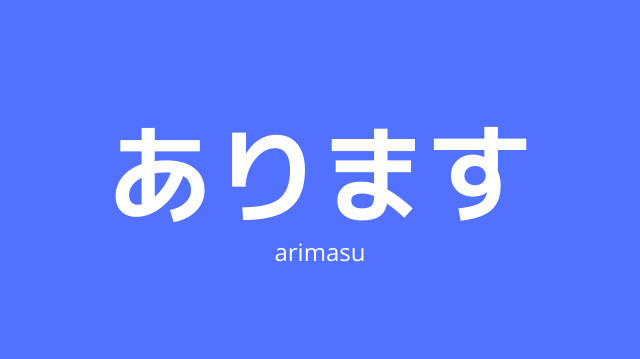The Japanese verb “arimasu” is one that gets used all the time in both everyday conversation, and in more literary contexts such as novels. It is a word that will help your comprehension quite a bit, so what is arimasu in Japanese?
That’s the topic of today’s post and will be covered in the first section below. There are a couple of potential meanings, so we’ll quickly look at all of them, and then we will dive into more depth on each throughout the post.
And since the Japanese language has many different forms of verbs depending on the politeness of the situation, we will explore some of arimasu’s alternative forms as well so that you can recognize this word no matter how it appears.
What Is Arimasu?
The Japanese verb arimasu is usually spelled in hiragana as あります and has a couple of different meanings:
- to be; to exist
- to have
- to be located
In order to know which meaning is being used, we have to take a look at the context of the situation that this word appears in. That will be explored more deeply in the following sections, but for right now let’s take a look at some of this word’s alternative forms.
First of all, it should be noted that there is a kanji that occasionally gets used. It is 有ります which just changes that first kana あ into the kanji 有.
The second thing to note is that あります is actually the polite form of the verb, but there is also a more casual form that is common to see as well.
The casual, or dictionary form of the word is ある (aru) and just like before we can use a kanji to spell it as 有る.
Since the most common way to see this word spelled is entirely in hiragana, I will stick to that for the rest of this article.
Arimasu’s First Meaning
The first way to understand あります is as the verb “to be; to exist” in English. This can be for both tangible things and intangible things.
- 可能性があります。
- kanousei ga arimasu.
- There is a possibility.
If you wanted to say that there was a book on the ground, or that there was some shoes by the front door, then あります would be the verb used to express this.
However, a key point to note about this verb is that it cannot be used for animate things. That would require its counterpart verb います (imasu) which is covered in a separate lesson.
At this point, I should probably explain what’s meant by “animate” and the opposite “inanimate” so that it’s clear when you use あいます.
Basically speaking, animate beings are living and move about. The best examples are humans and animals.
Inanimate beings are basically the opposite: non-living objects such as a house or a carpet.
However, we have this one gray area: plants!
Technically speaking, plants (fruits, vegetables, etc.) are living things. This would at first glance make you think that います is the correct verb to use with them, but they lack that second important feature of “moving around” in the way that humans and animals do.
So this means that あります is the correct verb to use when talking about plant-life.
- バナナがあります。
- banana ga arimasu.
- There is a banana.
Arimasu’s Second Meaning
The second meaning of today’s word is “to have” and it also has a couple of rules for its usage.
Just like in the first section, it has to be used with inanimate objects. You have to use some alternative words if you want to say that you have a living being, such as a pet, a girlfriend, and so on.
At any rate, using あります to say that you have something is actually very similar to just saying that something exists. For example, you might use it to talk about the food and drink in your refrigerator.
- ビールがあります。
- biiru ga arimasu.
- I’ve got beer.
It doesn’t have to just be physical items however. This word can also be used for more non-physical things such as idea, an appointment, or an experience that you’ve had.
- 用事があります。
- youji ga arimasu.
- I’ve got an errand.
Arumasu’s Third Meaning
The last meaning that I wanted to go over today has to do with the location of things. This could be something big and immovable, such as the location of a store, or it could be small and very mobile like a person’s wallet.
However, like we’ve talked about before it needs to be an inanimate object and not a person or animal.
- そこに財布がありました。
- soko ni saifu ga arimashita.
- There was a wallet there.
Now might be a good time to talk about this verb’s past tense. In order to say “was” you change あります to ありました (arimashita) for the polite version, and ある to あった (atta) in the casual form.
Anytime you want to ask “where is BLANK at?” then you can use the below phrase and just replace the word for store with whatever it is you are looking for.
- お店はどこにありますか?
- omise wa doko ni arimasu ka?
- Where is the store at?
Maybe you’ve found the store and are now shopping around, but can find the soap. Go ahead and use this same phrase to ask a clerk where the 石鹸 (sekken) is at.
A Very Useful Word
This is one of those words that you’re going to encounter a lot while reading and listening to Japanese. Hopefully this short lesson has helped clear up this word’s meaning in a couple of different situations.
There are a lot of additional situations where this word gets used that have their own nuance to them, but I think that the explanations and examples here ought to cover the most common scenarios.
If there was any part that was a little confusing, or if you just have a question about anything then let me know by leaving it down below in the comment box and I will do my best to address it.
Further Resources for Learning Japanese:
#3 Get My eBook (Secrets to Learning Japanese) for Free

またね!

When I watch YouTube videos from Japan ..there always seems to be ( apologies for spelling) Arimas or Arimaska ag the end of a sentence..what does this mean ?
Hi Ann, do you have a link to one of the videos as an example?
I watch many Japanese table tennis video , this word is being used many times: Harimastaaneh (arimastaaneh), what does it mean? Thank you.
https://www.youtube.com/watch?v=Y1l3znR64OA&t=41s&ab_channel=EuropeTT
Time: around :42-43 seconds, the speaker says : Harimastaaneh
Hey Amir, I checked out that video and I think the announcer is saying いってきましたね (itte kimashita ne) at that part.
Hi Nick.
I play PingPong (Table Tennis) and I hear this word many times in Japanese Table tennis videos , I am sure I hear clearly saying: Harimastaaneh.
Thanks anyway.
You did not mention the meaning to “groom” or “clean.” Can you update this?
Hey Tsukiko,
This article was focused more on the Japanese word 有る and wasn’t really intended to cover the words for groom/clean.
Was there something in particular you were looking for on them?
Thanks!